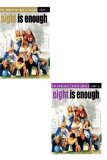| Reviews & Columns |
|
Reviews DVD TV on DVD Blu-ray 4K UHD International DVDs In Theaters Reviews by Studio Video Games Features Collector Series DVDs Easter Egg Database Interviews DVD Talk Radio Feature Articles Columns Anime Talk DVD Savant Horror DVDs The M.O.D. Squad Art House HD Talk Silent DVD
|
DVD Talk Forum |
|
|
| Resources |
|
DVD Price Search Customer Service #'s RCE Info Links |
|
Columns
|
|
|
Eight is Enough: The Complete Fourth Season, Parts 1 & 2
Another plate of homemade wishes, on the kitchen window sill. Warner Bros.' Archive Collection line of hard-to-find cult and library titles has released Eight is Enough: The Complete Fourth Season, Parts 1 & 2, a 2-volume, 7-disc, 27-episode collection of the ABC "dramedy's" 1979-1980 season. A big ratings' hit with family viewers during its relatively brief 4 1/2 year run, Eight is Enough is one of those TV shows that may not immediately come to mind when discussing "important" or "iconic" series from the 70s and 80s...but for viewers who were kids and teens when this first came out, it's a program that, when mentioned, invariably brings up a sudden, "Oh, yeah...I remember that show!" No extras for these just-okay transfers.
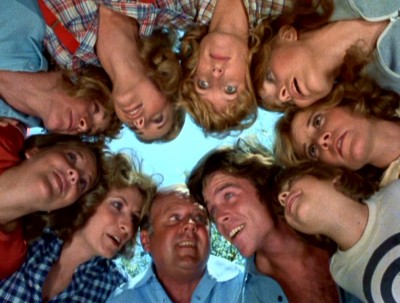
A brief set-up for those who haven't seen the series. Sacramento Register newspaper columnist Tom Bradford (Dick Van Patten) has a lot more on his mind than what next to bang out on his ultra-modern Selectric typewriter: try eight feisty children and an independently-minded young wife. Alternately avuncular and frazzled, combed-over Bradford, whose first wife, Joan, died a few years prior, somehow managed to snag pretty, preternaturally calm schoolteacher/Ph.D. student Abby Bradford (Betty Buckley) as his second wife. Living with them in their comfortable Colonial are Tom's eight children. Construction worker-handsome 26-year-old David (Grant Goodeve) is the eldest; the proverbial "prodigal son," returning from a cross-country jaunt after ditching his girlfriend, attractive attorney Janet (Joan Prather), at the altar. Next is humorless, strident, lecturing, 24-year-old Mary (Lani O'Grady), who's going to medical school to become a doctor...inbetween bringing everyone down. Searching, searching, searching 23-year-old Joanie Bradford (Laurie Walters) is next; she's a frustrated would-be actress who has taken a gofer job at a local TV station. Next up is perpetually cranky 22-year-old ginger, Susan Bradford (Susan Richardson); she's never happy unless she's bitching about something...including her new put-upon boyfriend, Merle "The Pearl" Stockwell (Brian Patrick Clarke), a minor-league pitcher whose hook-up with Susan clearly indicates one too many line-drives to the noggin. Next up is gorgeous dream girl Nancy (Dianne Kay): 22-years-old, blonde, and perfect in every way imaginable. She works as a secretary at a brokerage firm. Next up is 18-year-old Elisabeth (Connie Newton), your average, good-natured, "nice kid" with long Crystal Gale hair and a killer bikini body hidden under some rather unfortunate wardrobe choices; she's starting college this year. Next up is frequently shirtless 17-year-old Tommy Bradford (Willie Aames), the "rebellious" one, the high school punk with a VW bus, the one who plays guitar in a band. The one who breaks all the hearts. And then there's little 11-year-old scamp Nicholas (Adam Rich), the baby of the family who apparently needs remarkably little minding; he's chief "comedy relief" with all his funny little escapades and misunderstandings. Upon this tight-knit family will fall a dizzying array of situations, both funny and serious, but they'll persevere, when they daily fill their lives with love.
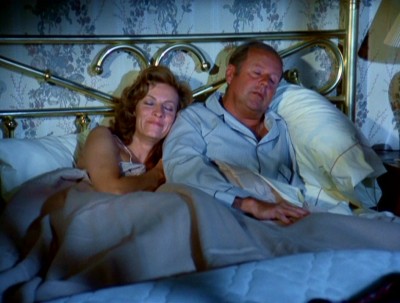
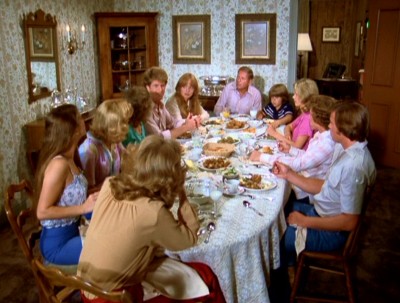
Except for a holiday Eight is Enough entry I had to review a few years ago as part of an Archive Collection Christmas TV compilation, I probably haven't seen an Eight is Enough episode since the show went off the network schedule back in 1981. To be fair, I was merciless in my criticism of that particular Christmas outing, Yes Nicholas, There Is a Santa Claus, from the series' first full season, finding it to be "a big mess, with bathos mixing uncomfortably with one-liners, an incongruous laugh track, and soft, sentimental scenes, creating not a layered dramedy, but a calculated, false schmaltz-fest,"...which, perversely, is exactly what I want from vintage Christmas television. But reviewing a whole season? I only had vague memories of Eight is Enough, a show that I grouped in my recollections as one of those mid-week titles--Wednesdays at 8:00am--that was a comfortable way to start some TV-watching after my homework was finished...but not much else.
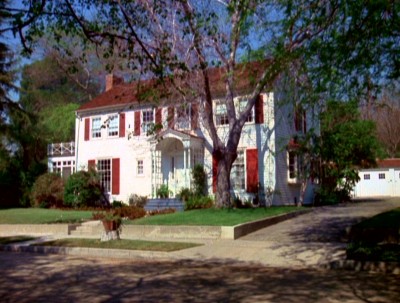
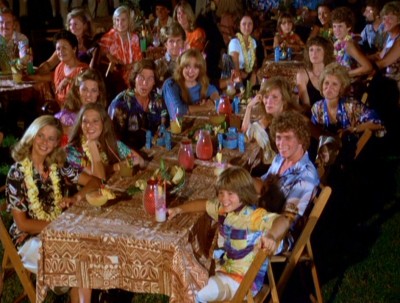
If anything, I recalled more clearly the publicity that always seemed to swirl around the series, more than the series itself. Eight is Enough was developed by producers Lee Rich and Philip Capice for Lorimar Productions, which had a huge critical and ratings hit with another family-oriented series, 1971's The Waltons...a long-running success they would top with yet another epic family drama: monster Nielsen hit, Dallas. Eight is Enough, an hour long comedy/drama with a somewhat incongruous laugh track, was slated by ABC as a mid-season replacement in the spring of 1977. It's conjecture, of course, but the show may have gone the way of Lorimar's previous attempt to update The Waltons' successful formula to more modern times--the highly-touted CBS bust, Apple's Way, from 1974--had it not been for the shocking headline-making news that Eight is Enough lead actress Diana Hyland, having completed only four episodes, died of breast cancer just two weeks after the series' premiere in March, 1977. Now, personal tragedy aside, you can call it "morbid curiosity" on the part of new viewers, or "cynical exploitation" on the part of the studio and network, but there's no denying that much-hyped news story initially drove more "look-see" viewers to Eight is Enough during its first few critical weeks, a story that had added novelty (and ink) due to Hyland's rather unconventional relationship with John Travolta, probably the hottest property in Hollywood at that time, with TV's Welcome Back, Kotter and soon-to-be released Saturday Night Fever. Even Hyland's replacement, Betty Buckley, continued this synergy, having been hired on the basis of her role in horror hit, Carrie--Travolta's first big screen success. All of that helped lead audiences to "sample" Eight is Enough to the point of making its few half-season episodes the 23rd-most popular show for the entire 1976-1977 television year--quite a feat.
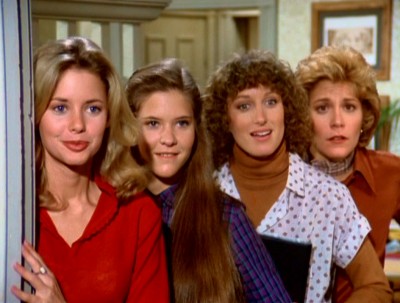
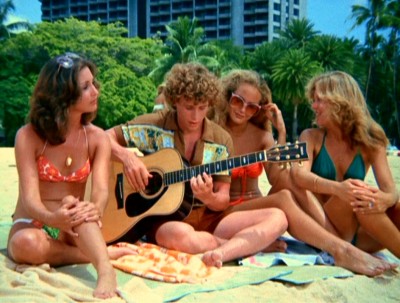
As for Eight is Enough's subsequent more troubling publicity--anonymous insider reports of the young cast acting unprofessionally, of chronic production delays, and even drug abuse among some of the cast members--none of that even came close to being on most viewers' radar until after the show was canceled. Viewers stuck around with Eight is Enough because, simply, they liked the characters they saw there, while the safe, comfortable sitcom-y vibe largely negated even the most serious issues discussed. Viewed today, and speaking only of this fourth season (it's impossible to trace the aesthetic arc of a series based on one season), the success rate of Eight is Enough tackling then-"hot button" contemporary issues, like a woman's place in the home or office, married affairs, or the rise of pornography, is spotty here, at best. In terms of achieving an overall cohesive tone, Eight is Enough walks a truly tough line as a "dramedy"--funny scenes juggled incongruously into a serious storyline, and vice versa--and more often than not, only partially succeeding. You can have a truly fine episode like The Courage to Be pop up, which focuses realistically on Tommy's friend, Ernie (Michael Goodrow), and his teen alcoholism, amid more ho-hum, conventional, even cliched offerings like Mary, He's Married, where sour Lani O'Grady has a "passionate" affair with that seething sex symbol...Squire Fridell. The juggling of the three or four-per-episode subplots is often quite well done (story editor Gil Grant seems the best at it); there's an unmistakable energy to the show inherent in this "something always happening somewhere" construction. However, that framework also lends itself to a certain self-imposed patness, born not only out of the network's still-insistent determination in the late 70s to end shows on relatively happy notes, but also the physical necessity to wrap scenes up quickly to move on to other subplots, before the dog food, diapers, and douche commercials interrupt still further.
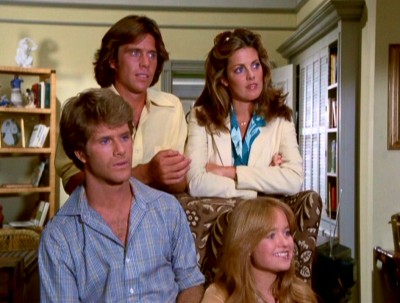
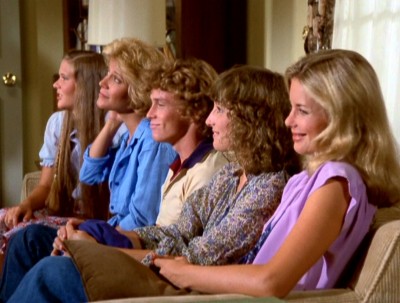
As always with television, particularly from this era, it's the performers and their characters, and more specifically, the likeability factor of both, that really make or break Eight is Enough. That old cliche of the medium holds: do you want these people in your house, week after week? And on that threshold, for the most part...they're a pleasing group of performers. Eight is Enough is a weird hybrid, a "dramedy" that switches tone left and right while really assuming the mask of nighttime soap, with reoccurring characters and continuous season-long story arcs. And with that big of a cast, spanning a few generations, there's bound to be someone here onto to which most viewers can latch. As a teen, I was, not too surprisingly, drawn to the pretty girls (Kay was certainly a TV crush when I was in middle school), with the Nicholas character being too young for me, and high schooler Willie Aames being too...Peter Frampton-filtered-through-William Katt-ish (it's clear that the producers and writers preferred opening and closing the episodes with humorous, gentle scenes between Adam Rich and Van Patten, who often credited Rich with a lot of the show's popularity). Viewed now, they're an appealing bunch, with Dickie Van Patten expertly anchoring the show with his easy mix of quite funny slow-burn frustration and unsubtle-but-earnest dramatic thesping. Beautiful, talented Betty Buckley can do no wrong here whenever she's given more than three lines together...but quite honestly, she's often treated as background filler in deference to the kids, and sometimes it shows on her frankly bored face. The rest of the actors range from charming and engaging (Walters, Kay, and Rich), to competent (Newton, Goodeve, and Aames), to largely unwatchable (Richardson and O'Grady), with us wishing to follow their weekly developments accordingly. Unquestionably, there were plenty of other viewers out there who believed the opposite, or in some other ranking of that list, and that aggregate, perhaps more than any other reason, is why Eight is Enough did so well in the ratings.
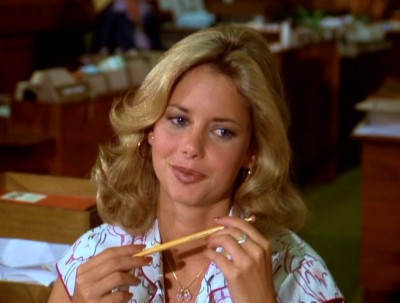
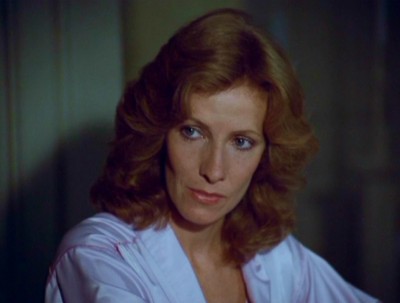
The season opener, Merle the Pearl, unfortunately centers on Susan's too, too predictable romance with genial Merle, while Nicholas has little girl trouble (Van Patten gets caught in a gas line--remember those?--but of course doesn't bitch about President Carter: he blames the gas guzzlers). The Cupid Crisis finds David returning to the series, intent on winning back ex-fiance Janet from new boyfriend, arrogant lawyer Terry Lester (they should have dragged this out a few more episodes; Lester is amusing as the put-out, left-out suitor). I Do, I Do, I Do, I Do features the double wedding of David and Janet, and Merle and Susan (run, Merle!), a sappy episode that no doubt drove me over to ratings challenger Real People on NBC. Ten Ships in the Night starts off rather well, offering an interesting glimpse into the ambitious Abby refusing to feel guilty about Nicholas' school troubles (stemming from his needing a mother). Unfortunately, it's resolved far too neatly at the end...as is The Devil and Mr. Bradford, with its snickering approach to Tom owning shares in a porno theater. Ditching drama altogether, The Night They Raided Bradfords is quite successful at building up a series of comedic misunderstandings when Merle's Southern hayseed sister (the only broad cultural stereotype Hollywood blithely allows itself to this day) comes to visit...and thinks the Bradfords are libertines involved in gambling and prostitution (here's your only chance to see punk Aames in a dog collar and a "USDA Choice" shoulder tattoo).
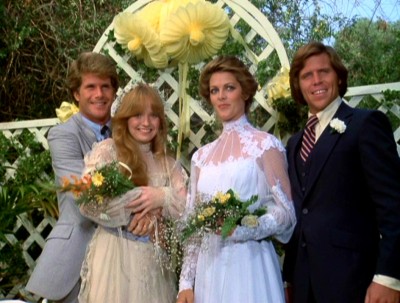
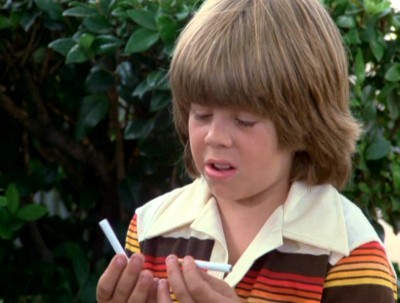
Big Shoes, Little Feet has a Brady Bunch subplot for Nicholas (a sub thinks he isn't as good as his older siblings), while Nancy promotes David's construction company by dating a potential client of his: she proves, however, to be frustratingly chaste... (Buckley has a nice scene with Rich, about being yourself). November "sweeps" two-parter Fathers and Other Strangers has the cast in Hawaii (shades of The Brady Bunch again...), with Van Patten coming off very well against an excellent, understated David Wayne as Tom's estranged father. Aames clearly benefits, too, from playing off the talented Wayne: it's the best I've ever seen him (the other island silliness detracts). Letter to One Bradford really breaks out the soap opera conventions--Tommy may die from a ruptured spleen!--while Nancy kinda falls for, get this, a Red Commie John Lone (yes, Eight is Enough producers and writers, we're hip to what you're trying to do, and no, it doesn't work). Separate Ways and Arrivals continues the unfortunate central story arc of Susan's marriage, with 70s male breadwinner Merle summarily punished and abandoned for wanting a goddamned steak when he goddamned well wants one. He of course grovels to get kvetching Susan back (when women bitch today that there are no more "real" men anymore...it's because of episodes like this one).
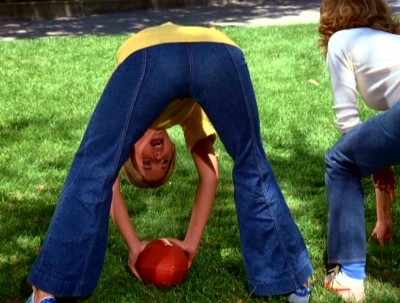
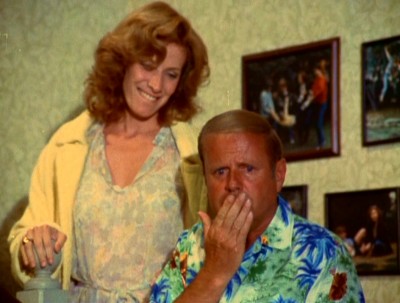
Brotherhood -- Sisterhood finds humorless Mary (jesus it's hard to watch O'Grady come off so badly, so consistently) slamming frats and sororities before her own openly Marxist college group is rejected by skeptical freshman Elizabeth (no, the Lefty writers here aren't playing fair: Elisabeth rejects the sorority...but she still goes to the Marxist disco dance fund raiser in the end). Speaking of O'Grady, she gets a big subplot in Mary, He's Married, as she's squired around town by married Squire Fridell (if you grew up when I did, there's no way you can take likeable hawkster Squire "King of the Commercials" Fridell seriously as a dramatic actor). My Son, the Prom Queen is a frivolous little nothing about Tommy striking a blow for equal (men's) rights, while Joanie receives a bad blow: maybe she's not going to be an actress (Walters is always good as the striving Joanie). As I wrote above, The Courage to Be is one of the season's best, giving Aames another strong showing as a confused, fed-up kid who simply can't help a friend--maybe I should move Aames up to the "charming and engaging" bracket above? Van Patten is also quite good here, as is Stanley Grover in a tiny but telling bit as troubled Ernie's father. Semi-Centennial Bradford could have been a great episode, chronicling Tom's descent into depression and confusion as he hits fifty and quits/is fired from his job...but the writers chicken out and put all the broken pieces back into place, sitcom-style (Buckley again gets a few brief, crystal-clear moments, dressing down the ungrateful brats, that must have been an oasis to her).
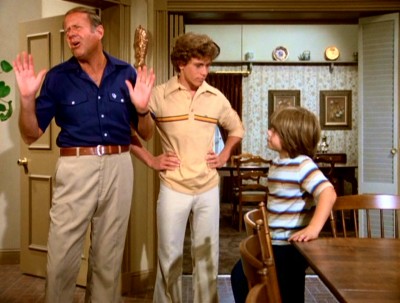
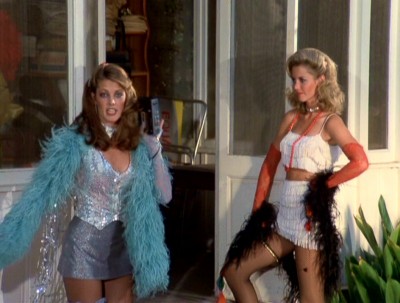
The Commitment has a familiar storyline--Tommy dumps "good girl" Michele Greene to make a pass at clueless teaser, sexy-as-hell Markie Post (no wonder Clinton...well, whatever). Seven More Days in Februrary is an excellent example of the "something going on somewhere all the time" element in the series, with the girls meeting guys over Winter break (the EST parody, "SAP," is pretty good: the leader addresses his group, "Hi, I frankly don't care about you." Classic). The Return of Joe Simons is a familiar but pleasant return for Jack Elam, who works well with Adam Rich (Mary Betten has a small but well-done part as Tom's new secretary). Bradford vs. Bradford is more-than-familiar, as well--David is jealous of Janet's law firm partner--but Nicholas' new friendship with black student, Mark James, is sensitively and effectively done. Betty Buckley finally gets a meaty central story in the excellent Memories, where she must finally deal with the love she still feels for her dead first love (Buckley is beautifully sad and conflicted here). She's given a little bit more to do than usual in Official Postions, where she refuses to scotch her potential book sale to placate failed novelist Tom. A Matter of Mentors, is a fairly tired look at office sexual harrassment (with Monte Markham perfectly cast),while Roll Over, Bradford, isn't much better, with Janice Paige back as Aunt Viv, caught up in an ill-advised romance, and Tommy finding out he's not the musician he thought he was. A Little Triangle finds Nancy contemplating marriage for the wrong reasons, as well, while Michael Goodrow's Ernie is back (to good effect again), trying to score a date for the Senior Prom (Ernie's platonic friendship with Elisabeth is well-done, with the actors working well off each other). Finally, Grad Night is a well-constructed outing where Tommy grows up and takes responsibility on the one night when he doesn't have to: his high school graduation (Abby's and Tom's attempted make-out in her MG is pretty funny).
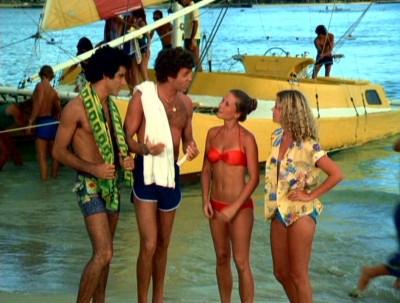

Secure in its usual Wednesday 8:00pm timeslot (with lead-out Charlie's Angels making its last appearance in the Nielsen's during the "Shelley Hack" debacle), Eight is Enough remained remarkably consistent in the ratings this season, landing as the 12th-most watched series on television for the 1979-1980 season (it was 12th and 11th for its first two full seasons). Competition from CBS was non-existent: two new sitcoms, the dire Last Resort and the bizarre Struck by Lightning (with, um...Jack Elam as Frankenstein, no less) were ignominiously yanked after only three episodes. Later in the season, CBS tried to mint new series from old properties--Young Maverick and Beyond Westworld--but neither one had any better luck than the sitcoms they replaced. Over on NBC, however, was Eight is Enough's doom: NBC's innovative reality programming, Real People. Debuting the previous spring as a special limited series, this first full season at 8:00pm saw the inexpensive little nothing become the 15th-most watched series for the year. By next season, it would knock Eight is Enough out of the Nielsen Top Thirty (don't believe anything you read on Wikipedia)...and out for good.
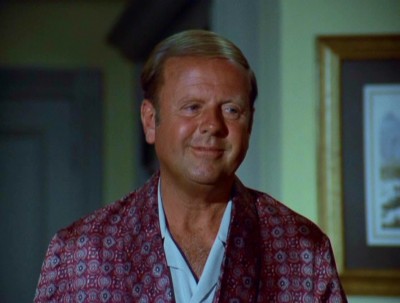
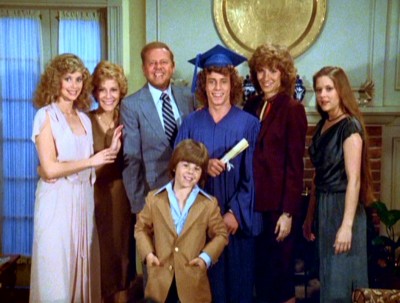
The DVD:
The Video:
The fullscreen, 1.37:1 transfers for Eight is Enough: The Complete Fourth Season is just okay, with slightly smeary video at times, a softish image, and the usual dirt and scratches.
The Audio:
The Dolby Digital English mono audio track is acceptable, with minimal hiss...and sometimes that mysterious laugh track popping up. No closed-captions or subtitles available.
The Extras:
No extras.
Final Thoughts:
Hit and miss, for sure...but undeniably entertaining. There's bound to be at least one character you'll like here, while the fast-paced, juggled subplots never leave you bored. If the plotlines aren't always original, or terribly deep at times, other times the writers and particularly the charming cast, get things just right. I'm recommending Eight is Enough: The Complete Fourth Season Parts 1 & 2
Paul Mavis is an internationally published movie and television historian, a member of the Online Film Critics Society, and the author of The Espionage Filmography.


|
| Popular Reviews |
| Sponsored Links |
|
|
| Sponsored Links |
|
|
| Release List | Reviews | Shop | Newsletter | Forum | DVD Giveaways | Blu-Ray | Advertise |
|
Copyright 2024 DVDTalk.com All Rights Reserved. Legal Info, Privacy Policy, Terms of Use,
Manage Preferences,
Your Privacy Choices | |||||||









